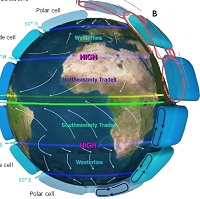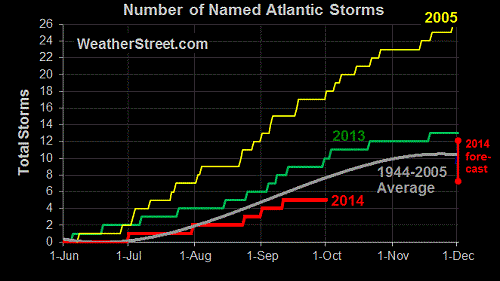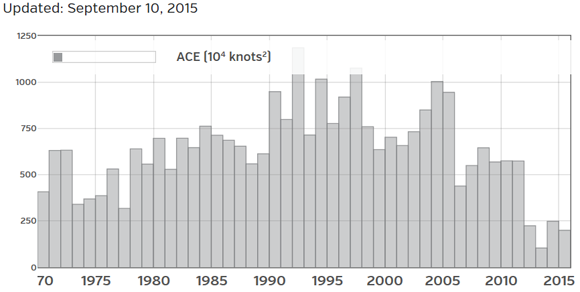A new paper from the Global Warming Policy Foundation (GWPF) reveals that there has been no increase in global hurricane activity, despite frequent claims that global warming is making hurricanes more of a problem.
As the report’s author, Paul Homewood, explains: “The theory is that rising sea-surface temperatures should make hurricanes more frequent or more intense or both. But observational data shows that there is no empirical evidence to support the theory.”
This is because most records of hurricane activity show no long-term increases, either in total numbers of hurricanes or of the most intense ones.
-Marc Morano 
Global warming was supposed to inject thermal energy into the atmosphere, and thus spawn one super cyclone after another. Yet observations refuse to cooperate with the alarmist hypothesis...
Colorado State University research scientist Philip Klotzbach reports that 2017 global cyclone energy “remains at record low levels“. 
During Louisiana’s disastrous August floods, Bill Nye, the popular science educator, went on national television to blame climate change for the calamity. “As the sea surface is warmer, more water evaporates,” he told CNN. “And so it’s very reasonable that these storms are connected to these big effects.”
This is a common claim among climate activists. But it has exactly zero basis in scientific literature. In fact, researchers have never established a connection between climate change and extreme weather events.
-Drew Johnson 
President Obama is the first president in 122 years, since Benjamin Harrison was in office, who has not seen a major hurricane strike the U.S. during his time in office. In a statement on its website, NOAA expressed concern that Americans might suffer from “hurricane amnesia.” 
“You don’t have to even be a scientist to look at these figures and you understand what it says.”
-Dr. Ivar Giaever, on the lack of severe weather 
By admitting it has “low confidence” in predictions of more frequent or more extreme droughts and tropical cyclones, IPCC is specifically revoking its previous more alarmist claims.
-Craig D. Idso, Robert M. Carter, S. Fred Singer, and Willie Soon 
Oct 1, 2014: Who would have predicted it? As of today (October 1) it’s been nearly 9 years since a major hurricane (Cat 3 or greater) has struck the U.S., the last being Wilma in October, 2005. Remember the 2005 hurricane season?
Landfalling hurricanes right and left. Katrina! This was going to be the new normal in a Global Warming world. Then the bottom dropped out of tropical activity.
-Dr. Roy Spencer 
[Dr. Trenberth] seems to have come to a conclusion that global warming has altered hurricane activity, and has already stated so. This does not reflect consensus within the hurricane research community.”
-Christopher Landsea 
The fact remains that the most careful empirical studies show that, so far at least, there has been no perceptible increase, globally, in either the number or the severity of extreme weather events.
-Nigel Lawson 
Environmentalist, Warming, Liberal, Narrative, Oops
NOAA have been very slow in releasing the final tornado data for 2016, but it is finally out now. As the provisional indicated at the time, last year was another very quiet year for tornadoes, and continued the pattern of a lower level compared to the 1970s... There were no EF-5 events (the strongest category) at all last year, the third year in succession for that. There were also only two EF-4s, which normally average eight a year.
Environmentalist, Warming, Liberal, Narrative
Natural weather patterns, not man-made global warming, are causing the historic drought parching California, says a study out Monday from federal scientists. "It's important to note that California's drought, while extreme, is not an uncommon occurrence for the state," said Richard Seager, the report's lead author and professor with Columbia University's Lamont Doherty Earth Observatory. The report was sponsored by the National Oceanic and Atmospheric Administration.
The persistent weather pattern over the past several years has featured a warm, dry ridge of high pressure over the eastern north Pacific Ocean and western North America. Such high-pressure ridges prevent clouds from forming and precipitation from falling. The study notes that this ridge — which has resulted in decreased rain and snowfall since 2011 — is almost opposite to what computer models predict would result from human-caused climate change.
Environmentalist, Warming, Liberal, Narrative, Oops
Such a streak, or “drought”, is unprecendented going back to 1900. As of the start of this hurricane season, the span will be 3,142 days since the last U.S. major hurricane landfall. The previous longest span is about 2½ years shorter...
OOPS: John Roach for National Geographic News July 30, 2007: The number of Atlantic hurricanes that form each year has doubled over the past century and global warming is largely to blame, according a new study.
Humans have had no detectable impact on hurricanes over the past century.
The Bottom Dropped Out in US Hurricanes
From @philklotzbach @ColoradoStateU seasonal hurricane forecast
— Roger Pielke Jr. (@RogerPielkeJr) April 6, 2017
2 remarkable slides showing bottom dropped out in US hurricanes past decade pic.twitter.com/yLlqSbn9wc
"…the science is extremely clear now, that warmer oceans make the average hurricane stronger, not only makes the winds stronger, but dramatically increases the moisture from the oceans evaporating into the storm – thus magnifying its destructive power – makes the duration, as well as the intensity of the hurricane, stronger." -Al Gore
Environmentalist, Warming, Liberal, Science, Narrative, Fear
Analysis of trends and of aggregated time series on climatic (30-year) scale does not indicate consistent trends worldwide. Despite common perception, in general, the detected trends are more negative (less intense floods in most recent years) than positive. Similarly, Svensson et al. (2005) and Di Baldassarre et al. (2010) did not find systematical change neither in flood increasing or decreasing numbers nor change in flood magnitudes in their analysis.
There is medium evidence and high agreement that long-term trends in normalized [property] losses have not been attributed to natural or anthropogenic climate change.
What’s more, despite common misconceptions stoked by the media in the wake of Katrina, Sandy, and the recent typhoon in the Philippines, even the IPCC concedes that it has “low confidence” that there has been any measurable uptick in storm intensity thanks to human activity. 
Warming, Liberal, Science, Narrative, Oops
In a Senate hearing Thursday, environmental scientist Roger Pielke of the University of Colorado said it’s “incorrect” to claim that global warming is spurring more extreme weather disasters. “It is misleading and just plain incorrect to claim that disasters associated with hurricanes, tornadoes, floods or droughts have increased on climate timescales either in the United States or globally,” Pielke said
Warming, Liberal, Financial, Science, Narrative, Oops, Economy
The CEO of Berkshire Hathaway told CNBC that he has not changed the way his companies calculate the likelihood of a natural disaster because of global warming. Berkshire Hathaway owns several insurance companies that often have to pay out huge claims when natural disasters strike. Environmentalists and the Obama administration have warned that global warming has caused natural disasters like hurricanes to become fiercer and more common. But Buffett’s experience leads him to believe otherwise, saying that insuring against hurricanes in the U.S. has been a profitable venture in recent years as only a few storms have actually made landfall.
Global Hurricane Activity At 45-Year Low
Global cyclone activity measured by the “Accumulated Cyclone Energy” (ACE) index over the past four years is even at a 45-year low. -Climate Depot
AGW True Believers: Pushing Non-Falsifiable Hypotheses...
The beauty of AGW is that any extreme weather event can be blamed on it and no one needs to prove it, nor can it be disproved.
Environmentalist, Warming, Liberal, Science, Narrative, Oops
2013 has turned out to be one of the "least extreme" weather years in U.S. history... Whether you’re talking about tornadoes, wildfires, extreme heat or hurricanes, the good news is that weather-related disasters in the US are all way down... Tornadoes: 'lowest total in several decades' Number of wildfires: 'On pace to be the lowest it has been in the past ten years' Extreme Heat: The number of 100 degree days may 'turn out to be the lowest in about 100 years of records' Hurricanes: 'We are currently in the longest period (8 years) since the Civil War Era without a major hurricane strike in the US (i.e., category 3, 4 or 5)'.
Environmentalist, Warming, Liberal, Narrative, Oops
“In summary, there continues to be a lack of evidence and thus low confidence regarding the sign of trend in the magnitude and/or frequency of floods on a global scale.”
In his written testimony Christy reinforced his remarks by asserting that extreme events are poor metrics for climate change and by their rarity run the danger of setting up a non-falsifiable hypothesis.
That is, whatever the event is, it is consistent with any hypothesis. Such an attitude does not advance science.
-Ken Haapala 
Environmentalist, Warming, Liberal, Narrative, Oops
“Current datasets indicate no significant observed trends in global tropical cyclone frequency over the past century … No robust trends in annual numbers of tropical storms, hurricanes and major hurricanes counts have been identified over the past 100 years in the North Atlantic basin.”
Environmentalist, Warming, Liberal, Science, Narrative, Oops
While many climate alarmists still try to tell us that global warming will increase tornadoes, we are in the middle of a tornado drought, and well below normal. Normally we’d see 1221 tornadoes in the USA, so far for 2013, only 716 have been reported. So far, we are about 200 tornadoes below this time last year, and last year was also a low event year.
Environmentalist, Liberal, Narrative
The USA in the last 12 months has seen the fewest number of tornadoes since at least 1954, and the death tolls from the dangerous storms have dropped dramatically since 2011. Just two years after a ferocious series of tornado outbreaks killed hundreds of Americans, the USA so far this year is enjoying one of the calmest years on record for twisters.
Since the middle of the twentieth century, the number of significant tornadoes hasn’t changed much at all, but the strongest storms have become less frequent.
Environmentalist, Hypocrisy, Warming, Liberal, Science, Narrative, Oops, Demagoguery
Today let’s look back a few years ago at U.S. tornado activity, when a record was set for most EF1 and stronger tornadoes in a 12-month period, from June 2010 to May 2011. In an email interview with ThinkProgress, Dr. Kevin Trenberth, one of the world’s top climate scientists, who has been exploring for years how greenhouse pollution influences extreme weather, said he believes that it is “irresponsible not to mention climate change” in the context of these extreme tornadoes...
Fast forward to today. In a NOAA blog post tornado expert Harold Brooks notes that during the 12-month period from May 2012-April 2013 there were just 197 tornadoes rated EF1 or stronger. This is, Brooks says, apparently a record low for U.S. tornadoes in a 12-month period.... Note to those saying "It's irresponsible not to mention climate change" in '11; same for ongoing tornado drought now?
-Andy Revkin
The injection of politics into the global-warming hypothesis has made it difficult to know where facts end and falsehoods begin. While alarmists have been blaming their fellow man for every hurricane, tornado and other ill wind whipped up by Mother Nature, science is now concluding that the cause of these damaging storms has nothing to do with human activity.
The surprise absolution of human beings from the crime of triggering severe weather phenomena was handed down by none other than the United Nations Intergovernmental Panel on Climate Change (IPCC), leader of the campaign to sell the world on anthropogenic climate change.
-The Washington Times 
Democrat, Environmentalist, Warming, Liberal, Obama, Science, Oops, Demagoguery, Lie
President Obama’s State of the Union, where he said, talking about global warming: “Heat waves, droughts, wildfires, and floods – all are now more frequent and intense.” That statement was demonstrably false, as SEPP’s The Week That Was points out: The claim is so factually challenged that it is a wonder it got by the White House staff.
Looking at the weather stations that have 80 years of data shows heat records were set in the 1930s, the Palmer drought index shows the 1930s and the 1950s were hotter and dryer with the 1930’s dust bowl lasting a decade. … Increased floods are not supported by the data, and, according to the National Interagency Fire Center, wildfires are declining.
The US has seen a decrease of about 20% in both hurricane frequency and intensity at landfall since 1900...
Data on floods, drought and tornadoes are similar in that they show little to no indication of becoming more severe or frequent.
Environmentalist, Warming, Editorial, Liberal, Narrative, Oops
Measured by total energy (Accumulated Cyclone Energy), hurricane activity is at a low not encountered since the 1970s. The U.S. is currently experiencing the longest absence of severe landfall hurricanes in over a century—the last Category 3 or stronger storm was Wilma, more than seven years ago.
Environmentalist, Warming, Liberal, Oops
While alarmists have been blaming their fellow man for every hurricane, tornado and other ill wind whipped up by Mother Nature, science is now concluding that the cause of these damaging storms has nothing to do with human activity. The surprise absolution of human beings from the crime of triggering severe weather phenomena was handed down by none other than the United Nations Intergovernmental Panel on Climate Change (IPCC), leader of the campaign to sell the world on anthropogenic climate change.
Here is a fact rarely, if ever, mentioned: 26 of the 50 states set their all-time high temperature records during the 1930s that still stand (some have since been tied). And an additional 11 state all-time high temperature records were set before 1930 and only two states have all-time record high temperatures that were set in the 21st century (South Dakota and South Carolina).
So 37 of the 50 states have an all-time high temperature record not exceeded for more than 75 years. Given these numbers and the decreased frequency of days of 100 degrees or higher, it cannot be said that either the frequency or magnitude of heat waves is more common today.
Environmentalist, Warming, Science
The extreme surface warmth over western Russia during July and early August is mostly a product of the strong and persistent blocking high. … The indications are that the current blocking event is intrinsic to the natural variability of summer climate in this region…
Environmentalist, Warming, Science
Upon closer inspection, however, researchers have noted that the prominent upswing in tropical cyclone detections beginning in the mid twentieth century is attributable predominantly to the detection of “shorties,” tropical cyclones with durations of less than 2 days. That the apparent surge in cyclone activity could be attributable to changes in the quality and quantity of detections has gained ground as a potential alternative explanation.
Environmentalist, Warming, Science
“If you look at the past 60 years of data, the number of tornadoes is increasing significantly, but it’s agreed upon by the tornado community that it’s not a real increase,” said Grady Dixon, assistant professor of meteorology and climatology at Mississippi State University.
“It’s having to do with better (weather tracking) technology, more population, the fact that the population is better educated and more aware. So we’re seeing them more often,” Dixon said. But he said it would be “a terrible mistake” to relate the up-tick to climate change.
Analysis of trends and of aggregated time series on climatic (30-year) scale does not indicate consistent trends worldwide. Despite common perception, in general, the detected trends are more negative (less intense floods in most recent years) than positive. Similarly, Svensson et al. (2005) and Di Baldassarre et al. (2010) did not find systematical change neither in flood increasing or decreasing numbers nor change in flood magnitudes in their analysis.
Environmentalist, Warming, Science
On December 4, 2011 it will have been 2,232 days since Hurricane Wilma made landfall along the Gulf coast as a category 3 storm back in 2005. That number of days will break the existing record of days between major US hurricane landfalls, which previously was between 8 Sept 1900 (the great Galveston Hurricane) and 19 Oct 1906. Since there won’t be any intense hurricanes before next summer, the record will be shattered, with the days between intense hurricane landfalls likely to exceed 2,500 days.
"TV news is like a nature hike through the Book of Revelation."












